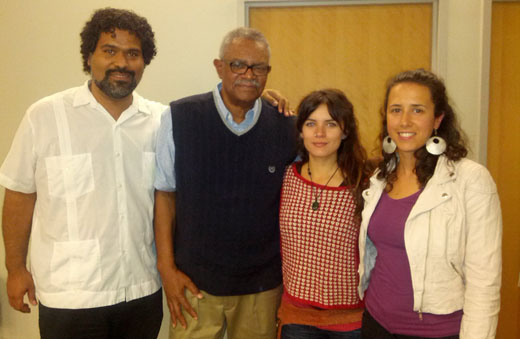
NEW YORK – Chilean student leaders Camila Vallejo and Noam Titelman began their U.S. visit with their counterparts from the United States and Canada here recently at a panel discussion on organizing strategies, the struggle for quality, affordable higher education and its relationship to democracy. The City University of New York Graduate Center hosted the panelists.
Vallejo, vice president of the Universidad de Chile Student Federation, and Titelman, president of the Universidad Catolica Student Federation, were in the U.S. to receive a human rights award on behalf of the Chilean student movement. Vallejo became internationally known last year for her leadership in the student struggle that challenged the right-wing government of Sebastián Piñera and for her membership in the Young Communist League of Chile. The New York Times called her a “glamorous revolutionary,” a tagline the media uses, often underplaying her intellect, social media savvy and leadership skills.
During the panel, all the student speakers emphasized the importance of democratizing their societies, expanding ethnic studies, access to higher education for youth of color, and the need for the composition of student bodies to reflect the economic and racial diversity of the societies in which they exist.
Both Titelman and Vallejo spoke from a unique perspective of young visionaries who are helping to lead their generation out of a post-dictatorship period. Vallejo explained that the Chilean student movement, which mobilized 90 percent of Chilean students in 2011 to protest government attacks on higher education, was not only a the largest protest movement in recent history, but a massive civics lesson, where thousands of students learned how political structures of the country are organized and can be affected.
Vallejo explained that under Augosto Pinochet’s brutal regime, which began with a coup in 1973 and did not officially end until 1990, one of the first casualties were civics classes. Pinochet’s goal, she said, was to eliminate democratic participation and knowledge in the country. While the dictatorship is over, Vallejo said, many of the anti-democratic institutional designs still exist. For example, 70 percent of Chilean students don’t know how the president or other political leaders are elected. Or at the University of Chile, one of the most prominent universities in the country, there is no department of political education but there is a business school.
These reasons are why the Chilean movement is educating young people about local and national elections, expanding democratic participation in the education and political systems and addressing class discrimination in education access. Chilean student movement demands include introducing a progressive tax on the wealthy, expanding quality education to the poor, and ending privatization of “knowledge production” so national investment in public education benefits everyone.
Vallejo and Titelman’s experiences in the post-dictatorship period, with parents who were directly affected by the massive trauma and terror of Pinochet’s government, make their ability to envision a truly democratic Chilean society all the more impressive and instructive. This society, they hope, will be free of imperialism and American neoliberal policies that helped instigate the military coup, overthrowing the democratically elected president, Salvador Allende.
 After pushing her way past dozens of cameras and fans that surrounded her when the panel finished, Vallejo made her way to meeting with leaders of the Communist Party USA and Young Communist League. Vallejo makes it a point to meet with the Communist Party in every country she visits. As a leader of the Chilean YCL, Vallejo says she wants to learn about the activities of other Communists around the world. Titelman also joined the meeting.
After pushing her way past dozens of cameras and fans that surrounded her when the panel finished, Vallejo made her way to meeting with leaders of the Communist Party USA and Young Communist League. Vallejo makes it a point to meet with the Communist Party in every country she visits. As a leader of the Chilean YCL, Vallejo says she wants to learn about the activities of other Communists around the world. Titelman also joined the meeting.
Vallejo said she knew about and appreciated the long history of solidarity between Chilean and American Communists. She and Titelman were interested in the CPUSA’s strategy of defeating the ultra-right danger electorally and helping to build movements of the main class and social forces capable of doing just that. Titelman said in his experience he has seen a difference between having a massive “naïve” movement that does not affect politics, and having a massive “effective” movement that does. Titelman said that if the U.S. far right is in power it is a threat to progressive movements and people around the world.
Vallejo and Titelman left New York for Washington, D.C. where they accepted on behalf of the entire Chilean student movement the Institute for Policy Studies’ Letelier-Moffitt Human Rights Award. The award is named after Orlando Letelier, a former Chilean diplomat and director of IPS’ Transnational Institute and Ronni Karpen Moffitt, an IPS development associate, who were murdered on September 21, 1976, by agents of Pinochet. IPS gives the award “to honor these fallen colleagues while celebrating new heroes of the human rights movement from the United States and the Americas.”
Photos: Camila Vallejo speaks with reporters in New York and poses with CPUSA leaders Libero Della Piana, Jarvis Tyner and Lisa Bergman. (PW/Libero Della Piana)










